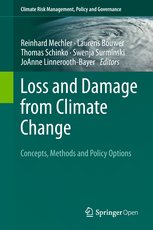Loss and Damage from Climate Change – Concepts, Methods and Policy Options, Series: Climate Risk Management, Policy and Governance, Springer, 2019.
Editors: R. Mechler, L. Bouwer, T. Schinko, S. Surminski, J. Linnerooth-Bayer (Eds.)
This book provides an authoritative insight on the Loss and Damage discourse by highlighting state-of-the-art research and policy linked to this discourse and articulating its multiple concepts, principles and methods. Written by leading researchers and practitioners, it identifies practical and evidence-based policy options to inform the discourse and climate negotiations.
With climate-related risks on the rise and impacts being felt around the globe has come the recognition that climate mitigation and adaptation may not be enough to manage the effects from anthropogenic climate change. This recognition led to the creation of the Warsaw International Mechanism on Loss and Damage in 2013, a climate policy mechanism dedicated to dealing with climate-related effects in highly vulnerable countries that face severe constraints and limits to adaptation. Endorsed in 2015 by the Paris Agreement and effectively considered a third pillar of international climate policy, debate and research on Loss and Damage continues to gain enormous traction. Yet, concepts, methods and tools as well as directions for policy and implementation have remained contested and vague.
Suitable for researchers, policy-advisors, practitioners and the interested public, the book furthermore:
• discusses the political, legal, economic and institutional dimensions of the issue
• highlights normative questions central to the discourse
• provides a focus on climate risks and climate risk management.
• presents salient case studies from around the world.
CMCC researchers Jaroslav Mysiak, RAAS Division Director, and Elisa Calliari (RAAS) contributed in fact with the book chapter “The politics of (and behind) the UNFCCC’s Loss and Damage Mechanism”.
“The issue of Loss and Damage”, says Elisa Calliari, “has been spearheaded by the Alliance of Small Islands States (AOSIS) since the early 1990s and has traditionally been tied to calls for compensation for the irreversible climate change impacts. Calls for liability and compensation associated with the L&D issue are a real taboo within climate negotiations because developed countries don’t want to open a “Pandora’s box” of endless requests of monetary compensation and remedy for increasing climate-related losses and damages around the world. This is arguably the main reason why it took more than 20 years for the L&D debate to be institutionalised under the UNFCCC.”
For further informations about this book, you can also read this news!
CMCC Divisions



